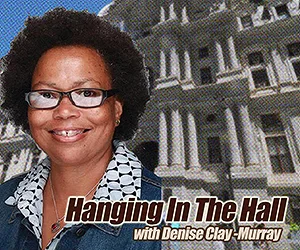A new Philadelphia City Council task force focuses on reparations, and what form city residents would like to see them take.
By Denise Clay-Murray

By Denise Clay-Murray
Right now, reparations, the concept of acknowledging a human rights violation and seeking to repair it through compensation of some kind, is having a moment.
The state of California has empaneled a task force to look at how it would look for the state to provide compensation to its Black residents. Evanston, Illinois began providing reparations in the form of cash payments in 2019. Other municipalities are also discussing the concept.
Before leaving the U.S. House of Representatives, the late Congressman John Conyers made a practice of introducing legislation that would form a reparations task force on the federal level.
And now, Philadelphia is joining the list of municipalities that is looking at the possibility of reparations for the city’s Black community. City Council passed a resolution proposed by Councilmembers Kendra Brooks and Jamie Gauthier and the National Coalition of Blacks For Reparations In America (N’COBRA) back in June to create the task force.
“This is exciting for me because you can tie a direct line between the wrongs of slavery, the horrible sin that happened in our country, and all of the racist policies that came after slavery that were never actually repaired and the condition of our neighborhoods today,” she said.
Co-chaired by N’COBRA PHL leaders Breanna Moore and Rashaun Williams, the idea behind the task force is to gather information to share with the City of Philadelphia, the Commonwealth of Pennsylvania and, by extension, the federal government on how these entities can atone for the institutional racism at America’s core, especially the institution of chattel slavery.
While there might be some things that the task force itself might think Black Philadelphians need, they won’t be making those decisions, Moore and Williams said in a statement. Those decisions will be made by the people, they said.
“This reparations task force is a vehicle to implement the vision of Black Philadelphians for Black Philadelphians,” they said. “To strengthen the repair that is already happening and open the floodgates to welcome the future healing that will be.”
But it needs Black Philadelphians to make it happen. Right now, task force leaders are looking for Philadelphians who are interested in being a part of the discussion of what reparations would look like in Pennsylvania in general and in Philadelphia in particular. To qualify for membership, you must be one of the following:
• Descended from enslaved Africans in the United States,
• The descendants of people described as Black, Negro or Colored since 1865,
• and/or the descendants of emancipated Freedmen.
There are eight slots open for task force coordinators in the following categories:
• Economic Justice
• Health and Wellness
• Public and Post-Secondary Education
• Atlantic World History
• Human Services and Community Resources
• Criminal and Legal Justice
• Law and Foreign and Domestic Policy and
• Urban Planning and Sustainable Development
If you’re interested in applying for one of the eight positions available, or if you just want more information on the Reparations Task Force, go to: Rep215.com or go to: phlcouncil.com/reparations. The deadline to apply is Jan. 15, 2024.
The task force is expected to be announced during Black History Month, which makes sense.
But in the end, reparations are an appropriation issue. To compensate people either through investment in their communities, making penalties harder for banks that practice redlining, or just plain giving them money is going to require some serious political will on the part of Philadelphia City Council once the task force’s report is released. And even then, Mayor-elect Cherelle Parker will have to sign it to make it law.
Somehow, I don’t see there being any shortage of people staying on top of this issue.
Disclaimer: The views, thoughts, and opinions expressed in the article belong solely to the author, and not necessarily to the author’s employer, The Philadelphia Sunday SUN, the author’s organization, committee or other group or individual.

